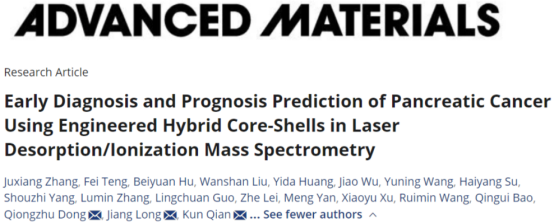- News
Breakthrough! New technology for Early Diagnosis of Pancreatic Cancer Invented by Researchers From Shanghai Jiaotong University and Fudan University
https://mp.weixin.qq.com/s/4SrncvVuZzUc31Nqn1VDsA
Professor Qian Kun, Professor Long Jiang, from Shanghai Jiaotong University, and Professor Dong Qiongzhu, form Fudan University, led the research team to prepare innovative hybrid core-shell nanomaterials, combined with laser desorption ionization mass spectrometry technology to achieve up to 1000 times of metabolic signal enhancement, and the early diagnosis of pancreatic cancer makes further progress!

Recently, Professor Qian Kun from the School of Biomedical Engineering, Shanghai Jiaotong University, Professor Long jiang from Shanghai General Hospital, Shanghai Jiao Tong University School of Medicine , and Professor Dong Qiongzhu from Fudan University affiliated Minhang Hospital, working together, made a major breakthrough in the field of early diagnosis of pancreatic cancer. They precisely regulate hybrid core-shell nanomaterials, with laser desorption ionization mass spectrometry technology, achieved up to 1000x enhancement of metabolic signals, which provided a new metabolomics approach to high precision early diagnosis of pancreatic cancer. The research has recently been published in the internationally renowned journal Advanced Materials (29.4 points)
Pancreatic cancer, known as the "king of cancer", is a malignant tumor of the digestive tract with hidden onset. The biggest danger of this type of cancer is its lack of obvious symptoms in early stages. Many cases have progressed to advanced stages when diagnosed, often accompanied by cancer cell metastasis, which greatly increases the difficulty of treatment and results in poor prognosis. The strong invasiveness and extremely high mortality rate, for a long time, has been a serious challenge faced by the medical community.
Prof. Long Jiang and Prof. Dong Qiongzhu emphasize that for the treatment of Pancreatic cancer, early detection is crucial, and the new technology could achieve high-precision diagnosis. Identifying early patients gets better treatment outcome and healing opportunities. The traditional diagnostic methods, such as highly invasive pathological biopsy and low sensitivity imaging methods, exits obvious limitations, therefore, develop safe and efficient early diagnosis techniques is crucial for pancreatic cancer, for improving patient survival rate and quality of life and reducing medical costs.
Innovative technology:
Hybrid core-shell nanomaterials could achieve 1000-fold metabolic signal enhancement, bringing new early diagnostic possibilities. The research team led by Professor Qian Kun, Professor Long Jiang, and Professor Dong Qiongzhu have made significant breakthroughs in this field by developing a series of precision designed hybrid core-shell structured nanomaterials, and analyzing its nuclear size and shell crystal phase. The precise regulation at the nanoscale significantly improves the photothermal conversion performance of materials and the effective separation and delayed recombination of electron hole pairs, hence promotes understanding of the process of absorption and ionization.
The team utilizes the synergistic effect of the core-shell structure to regulate desorption and ionization efficiency at the nanoscale, optimized Au@SiO2 @ZrO2 as a mass spectrometry substrate material. In metabolic small molecule detection, they achieved up to 1000x signal enhancement. Based on this platform, the metabolites of pancreatic cancer serum samples were detected, and successfully extracted serum metabolic fingerprints.
Research outcome:
Metabolic fingerprint: accurate diagnosis of pancreatic cancer.
The area under the curve is as high as 0.958, with an accuracy rate of 92%!
High accuracy: early pancreatic cancer (stage I/II) up to 92% diagnostic accuracy
This platform has a low sample consumption (~0.1 microliters of serum sample per person), fast processing speed (~30s/person) and advantages such as high analytical throughput (384 samples/detection).
Based on this enhanced serum metabolic fingerprint, This study achieved high precision diagnosis of early pancreatic cancer (stage I/II). The area under the curve is as high as 0.958, and the diagnostic accuracy is as high as 92%.
Innovation system:
Building a prognostic prediction scoring system significantly improves the accuracy of disease prediction, assists doctors in developing more effective personalized treatment plans. In addition, according to the serum metabolic fingerprint of patients with pancreatic cancer, they have developed an innovative prognostic prediction scoring system.
Compared to the traditional biomarker CA19-9, The system showes significant performance improvement (p<0.05) in predicting the survival of patients with pancreatic cancer. This not only means that the system has more accurate prediction of disease progression, It also provides doctors with more effective tools to develop personalized treatment plans.
This work based on precision controlled hybrid core-shell nanomaterials, not only reveals the mass spectrometry mechanism related to metabolites, it also has great potential to meet the clinical needs of early diagnosis of pancreatic cancer.
the research team will actively engage in communication and cooperation with clinical practice, promoting the technology from laboratory to clinical application, benefiting more patients with pancreatic cancer.
At the same time, they also hope to promote science through popular science to raise public awareness of pancreatic cancer, reminding high-risk groups to undergo regular relevant examinations for early detection, diagnosis, and better treatment to improve the cure rate and survival rate of pancreatic cancer.
This work based on precision controlled hybrid core-shell nanomaterials, not only reveals the mass spectrometry mechanism related to metabolites, it also has great potential to meet the clinical needs of early diagnosis of pancreatic cancer.
the research team will actively engage in communication and cooperation with clinical practice, promoting the technology from laboratory to clinical application, benefiting more patients with pancreatic cancer.
At the same time, they also hope to promote science through popular science to raise public awareness of pancreatic cancer, reminding high-risk groups to undergo regular relevant examinations for early detection, diagnosis, and better treatment to improve the cure rate and survival rate of pancreatic cancer.

Professor Qian Kun | Shanghai Jiao Tong University
·Special Researcher and Doctoral Supervisor at Shanghai Jiao Tong University,
·Shanghai University Distinguished Professor (Oriental Scholar), Bachelor's degree from Fudan University,
·PhD from the University of Queensland, Australia,
·Previously worked as a visiting scholar at Stanford University in the United States.
·Focusing on molecular omics engineering and translational medicine applications, our work covers three main research directions: molecular omics interface recognition, detection equipment software and hardware, and targeted molecular reprogramming. I have published over 120 SCI papers in journals such as Cell, with a total impact factor of over 1400 points, and have received multiple awards from international societies and journals; Applied for more than 40 invention patents from the first inventor (more than 10 have been authorized and 9 have been converted), and led a team responsible for more than 20 major and key scientific research projects at the national and Shanghai levels; Received the Gold Award for Excellent Innovative Products in Extracorporeal Diagnosis in China, the Special Gold Award at the China University Science and Technology Fair, and the First Prize of the Shanghai Technology Invention Award.

Professor Longjiang | Pancreatic Surgery Department of Shanghai General Hospital
Director of the Pancreatic Surgery Department and Director of the Comprehensive Diagnosis and Treatment Center for Pancreatic Tumors at the First Affiliated People's Hospital of Shanghai Jiao Tong University School of Medicine;
Member of the Pancreatology Group of the General Surgery Branch of the Shanghai Medical Association;
Vice Chairman of the Solid Tumor Focused Diagnosis and Treatment Committee of the Shanghai Anti Cancer Association;
Leader of the Youth Neuroendocrine Oncology Group of the Shanghai Anti Cancer Association;
Standing Committee Member of the Big Data and Real World Research Committee of the China Anti Cancer Association;
Member of the Artificial Intelligence Committee of the China Anti Cancer Association
Standing Committee Member of the Science Popularization Professional Committee of the China Anti Cancer Association.
Mainly engaged in clinical and basic transformation research of pancreatic tumors, as the project leader, I have undertaken national natural science foundation general projects, key clinical discipline projects of the Ministry of Health, and key projects of the Shanghai Municipal Science and Technology Commission. Has won the Young Scholar Award from the American Society of Pancreatic Surgery, the "Golden Finger" Award from the Chinese Medical Association for Surgical Surgery, and the Excellent Invention Gold Award from the Shanghai Excellent Invention Selection Competition. Published over 30 SCI papers and obtained 4 national invention patents. Received titles such as Outstanding Secretary General of Shanghai Association for Science and Technology and Shanghai Science Popularization Public Welfare Figure.

Professor Dong Qiongzhu | Fudan University Affiliated Minhang Hospital
Director of the Key Laboratory of Digestive Tumor Full Cycle Monitoring and Precision Intervention of the Shanghai Municipal Health Commission,
Researcher at Minhang Hospital affiliated with Fudan University
Doctoral supervisor.
Outstanding academic leader in Shanghai,
Core member of the strategic innovation team for the high-level local construction project "Cancer Metastasis and Original Biopharmaceuticals" in Shanghai.
Engaged in long-term research on molecular prediction, mechanism, and targeted therapy strategies for the occurrence and development of digestive tumors. Conducted collaborative research at MD Anderson Cancer Center from April 2015 to July 2016. Hosted nearly 20 national key research and development projects, as well as projects funded by the National Natural Science Foundation of China. I have published over 50 SCI papers in academic journals such as Gut, Med, Hepatology, Signal Transport Target Then, Cancer Res. Served as an editorial board member for SCI journals such as J Clin Transl Hepatol, Curr Gene Ther, Sci Rep, and as a reviewer for over ten journals including Signal Transduct Target Ther, J Hematol Oncol, and Clin Transl Med.
